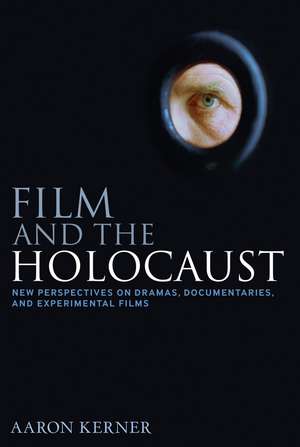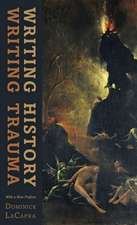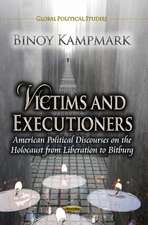Film and the Holocaust: New Perspectives on Dramas, Documentaries, and Experimental Films
Autor Aaron Kerneren Limba Engleză Paperback – 6 iul 2011
| Toate formatele și edițiile | Preț | Express |
|---|---|---|
| Paperback (1) | 241.42 lei 6-8 săpt. | |
| Bloomsbury Publishing – 6 iul 2011 | 241.42 lei 6-8 săpt. | |
| Hardback (1) | 718.19 lei 6-8 săpt. | |
| Bloomsbury Publishing – 6 iul 2011 | 718.19 lei 6-8 săpt. |
Preț: 241.42 lei
Preț vechi: 274.69 lei
-12% Nou
Puncte Express: 362
Preț estimativ în valută:
46.19€ • 48.37$ • 38.32£
46.19€ • 48.37$ • 38.32£
Carte tipărită la comandă
Livrare economică 09-23 aprilie
Preluare comenzi: 021 569.72.76
Specificații
ISBN-13: 9781441124180
ISBN-10: 1441124187
Pagini: 352
Ilustrații: 130
Dimensiuni: 152 x 229 x 28 mm
Greutate: 0.54 kg
Editura: Bloomsbury Publishing
Colecția Continuum
Locul publicării:New York, United States
ISBN-10: 1441124187
Pagini: 352
Ilustrații: 130
Dimensiuni: 152 x 229 x 28 mm
Greutate: 0.54 kg
Editura: Bloomsbury Publishing
Colecția Continuum
Locul publicării:New York, United States
Caracteristici
Based around a successful course that the author has been teaching for years
Notă biografică
Aaron Kerner is an Associate Professor in the Cinema Department at San Francisco State University. His curatorial and research work examines the problems of representations, exploring the difficulty of representing catastrophic events and the uneasy transfiguration of history and memory into narrative form.
Cuprins
AcknowledgmentsChapter 1 IntroductionChapter 2 The Realistic ImperativeChapter 3 The Holocaust as Dramatic SpectacleChapter 4 Defiance and ResistanceChapter 5 Holocaust Comedies?Chapter 6 Sadism and Sexual DevianceChapter 7 Body Genres I: Melodramatic Holocaust FilmsChapter 8 Body Genres II: Pornography and ExploitationChapter 9 Body Genres III: The Horror Genre and the HolocaustChapter 10 Holocaust Documentaries I: Telling Like It Really WasChapter 11 Holocaust Documentaries II: TestimonialsChapter 12 Holocaust Documentaries III: Personal DocumentariesChapter 13 Holocaust Documentaries IV: The Poetic DocumentaryChapter 14 Experimental Films I: Rituals of MemoryChapter 15 Experimental Films II: Lost and Found (Footage)FilmographyBibliography Index
Recenzii
At last--a wide-ranging, richly structured, incisive study of how this horrific event appears and reappears in dramatic, comedic, exploitative, pornographic, documentary, and poetic representations. No one has surveyed the full range of Holocaust material like this before. Kerner brings stunning clarity to the most basic issues involved in representing catastrophe. Bill Nichols, Professor of Cinema at San Francisco State University, and author of Engaging Cinema, Introduction to Documentary (2nd edition) and Representing Reality.
The unprecedented catastrophe of the Holocaust has thrown into question the ability of the cinema to adequately represent such an event in all its enormity and complexity. Yet this crisis of representation has done little to stem the flood of "Holocaust films" that has appeared over the last five decades. Scrupulously researched and theoretically informed, Film and The Holocaust is the first study that sets aside the high/low debates about authenticity, accessibility or moral value, to closely examine the myriad cinematic forms through which the Holocaust is represented. From the Shoah-business of the Hollywood blockbuster to the intimate and formally challenging explorations of the Avant-Garde, Kerner discusses all forms with equal authority. Film and The Holocaust is an essential introduction to the breadth of films and the wide range of scholarship of what has become a major cinematic genre. Jeffrey Skoller, Film Studies at UC Berkeley, and author of Shadows, Specters, Shards: Making History in Avant-Garde Film
Article in The Jewish Telegraph
The unprecedented catastrophe of the Holocaust has thrown into question the ability of the cinema to adequately represent such an event in all its enormity and complexity. Yet this crisis of representation has done little to stem the flood of "Holocaust films" that has appeared over the last five decades. Scrupulously researched and theoretically informed, Film and The Holocaust is the first study that sets aside the high/low debates about authenticity, accessibility or moral value, to closely examine the myriad cinematic forms through which the Holocaust is represented. From the Shoah-business of the Hollywood blockbuster to the intimate and formally challenging explorations of the Avant-Garde, Kerner discusses all forms with equal authority. Film and The Holocaust is an essential introduction to the breadth of films and the wide range of scholarship of what has become a major cinematic genre. Jeffrey Skoller, Film Studies at UC Berkeley, and author of Shadows, Specters, Shards: Making History in Avant-Garde Film
Article in The Jewish Telegraph








